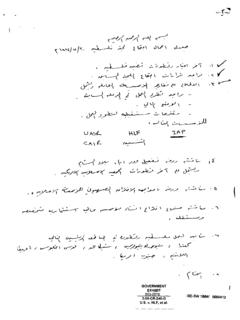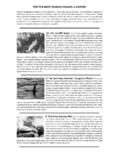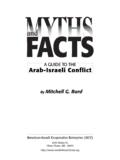Transcription of FAQs on R efugees Who are the Palesti nian refugees?
1 Al-Awda, The Palestine Right to Return CoalitionPO Box 131352, Carlsbad, CA 92013 USATel: 760-685-3243 Fax: 360-933-3568 Email: on Refugees Who are the Palestinian refugees? Palestinian refugees are the indigenous inhabitants of Palestine, the majority of whom weredispossessed, ran away or were expelled when the state of Israel was created in 1948. Thisdispossession and expulsion has continued since with the second largest such event inPalestine taking place during the 1967 war, which Israel launched on its Arab neighbors andwhich resulted in the occupation of the Gaza Strip and the West Bank. Palestinian refugees generally fall into three main groups: Palestinian refugees displaced in1948, internally displaced Palestinians who remained within the areas that became the stateof Israel, and Palestinian refugees displaced in 1967 from the West Bank and Gaza Strip. Forthe past 57 years, Israel has continued to deny Palestinian refugees their right to return totheir ancenstral towns, villages and did the Palestinian refugee problem arise?
2 The Palestinian refugee problem arose from a systematic policy of ethnic cleansing, theresults of which are apparent in the Palestinian refugee camps and in the Palestinian shatat(exile). These policies of ethnic cleansing continue to this policy sought to create an exclusive homeland for Jews in Palestine, a region thatalready had an indigenous population with a history stretching back thousands of years. Thecharacterization of Palestine as "a land without a people for a people without a land" was amyth created to suggest that Palestine was waiting to be populated. Nothing was furtherfrom the truth and this has been evidenced by the atrocities of 1948 and since. How did Israel expel Palestinians from their land?Jewish terrorist groups such as Haganah, Irgun and Stern terrorized the Palestinian street,destroyed villages and slaughtered entire Palestinian families. Thirty four massacres weredocumented by Zionist historian Benny Morris to have occured within a few months:Al-Abbasiyya, Beit Daras, Bir Al-Saba', Al-Kabri, Haifa, Qisarya.
3 These attacks were part ofPlan Dalet and aimed to annihilate the Palestinian population. Approxiamtely 50% of allPalestinian villages were destroyed in 1948 and many cities were cleared from theirPalestinian population including Akka, Bir Al-Saba', Bisan, Lod, Al-Majdal, Nazareth, Haifa,Tabaria, Yaffa, and West-Jerusalem among forces killed an estimated 13,000 Palestinians and forcibly evicted 737,166 Palestinians from their homes and land. Five hundred and thirty one Palestinian villageswere entirely depopulated and destroyed. The tragedy of the refugees continued in 1967. That year, Israel occupied the West Bankand Gaza Strip, and many Palestinians were uprooted for the second time: 15,000 fled fromthe West Bank, 38,000 fled from the Gaza Strip and 16,000 fled from the Syrian GolanHeights. The refugees found shelter in surrounding countries including Jordan, Syria many Palestinian refugees are there today?Palestinians are the largest and longest suffering group of refugees in the world.
4 One inthree refugees world wide is Palestinian. There are about million Palestinian refugeesworldwide. More than million Palestinian refugees and their descendents displaced in1948 are registered for humanitarian assistance with the United Nations. Another millionPalestinian refugees and their descendents, also displaced in 1948, are not registered withthe UN. About 263,000 Palestinians and their descendents are internally displaced insidepresent-day "Israel". Descendents of refugees are included in the total population becausethey are still unable to realize their basic rights. About 20,000 Palestinians were internallydisplaced in the West Bank and Gaza Strip by 2001, some 3,000 of whom were newlydisplaced during that year. At least 26,000 Palestinians left the West Bank and Gaza Stripfor Jordan and did not return between June 2000 and July 2001. Such transfer of thePalestinian population driven by hard econmic and discriminatory conditions do Palestinian refugees reside today?
5 The majority of Palestinian refugees live not far from their homes of origin either in theirown homeland or in neighboring countries. More than half the refugee population lives inJordan. Approximately live in the West Bank and Gaza Strip, comprising about 50percent of the population in those areas. About 15% live in almost equal numbers in Syriaand Lebanon. About 260,000 internally displaced Palestinians reside in present-day remaining refugee population lives throughout the world, including the rest of the Arabworld. Of the million refugees registered with the United Nations Relief and WorksAgency (UNRWA), 33% live in UNRWA's 59 refugee camps throughout the West Bank andGaza Strip, Jordan, Syria and are the basic rights of refugees? According to international law, refugees have the right to return to their homes of origin,receive real property restitution, and compensation for losses and damages. The UN GeneralAssembly set forth the framework for resolving the Palestinian refugee case in UN Resolution194 (III) which provides: repatriation for those refugees "wishing to return to their homesand live in peace with their neighbors," or compensation for those choosing not to November 22, 1974, Resolution 3236 clarified the right to return as an "inalienableright".
6 In Res. 302 (IV), the UN General Assembly created UNRWA and assigned the agencythe task of caring for Palestinian refugees. UNRWA defined Palestinian refugees as personswho resided in Palestine two years prior to the outbreak of hostilities in 1948 and who losttheir homes and livelihoods as a result of that are Palestinian refugees excluded from coverage under UNHCR's mandate?When the UN adopted the Refugee Convention and established the UN High Commissionerfor Refugees, it excluded those falling within the UNRWA mandate from coverage underUNHCR's mandate. In effect, this has meant that UNHCR does not concern itself with (orcount) Palestinian refugees in Jordan, Lebanon, Syria, or the West Bank and Gaza Strip,although the agency assists Palestinian refugees outside the UNRWA-mandate unintended, the effect has been that Palestinian refugees have enjoyed fewerprotections than other refugees because UNRWA only has a mandate to provide Palestinianrefugees with humanitarian assistance, and, unlike UNHCR, does not have a specificprotection something being done to rectify this exclusion?
7 Since the current Palestinian uprising began, the UN Commission on Human Rights, theBadil Resource Center for Palestinian Residency and Refugee Rights, and some independentrefugee experts have argued that the fact that many Palestinian refugees lack effectiveprotection should trigger the applicability of the UN Refugee Convention to Palestinians inthe UNRWA mandate area. These organizations and individuals cite Article 1D of theRefugee Convention, which effectively states that whenever protection or assistance forPalestinian refugees has ceased for any reason before their situation is resolved inaccordance with the relevant UN resolutions, they shall "be entitled to the benefits of thisConvention." Proponents of this view contend that UNHCR should have begun to exercise itsprotection mandate for Palestinian refugees long ago when it became clear that the UNConciliation Commission for Palestine, which was concerned with protection for Palestinians,was unable to carry out its have Palestinian refugees not returned to their homes?
8 The state of Israel refuses to allow Palestinian refugees to exercise their right to returnciting three main arguments; first, that there is no space in Israel for the refugees to return,second, that the return of Palestinian refugees would threaten security and lead to conflict,and finally, that the return of the refugees would jeopardize the Jewish nature of the regards to the first argument recent research shows that 80% of the Jewish populationof present-day 'Israel' resides on 15% of the land. The areas where Palestinian villages weredemolished lie mainly uninhabited. Hence there is space. As for security concerns,Palestinian refugees broadly accept that exercising their right to return would not be basedon the eviction of Jewish citizens but on the principles of equality and human rights. Thefinal argument though is a testament to Israel's false claim that it is the only democracy inthe Middle East. Israel is a democracy for Jews only, and this religion-based discriminationor oxymoron should not be confused with real there a durable solution?
9 There can be no comprehensive solution without honoring the rights of Palestinian UN human rights treaty committees have found key aspects of Israel's nationality,citizenship, and land legislation which effectively bar Palestinian refugees from exercisingtheir inalienable right to return to be incompatible with the rights codified in relevant humanrights conventions. Israel's ongoing aggression against the Palestinian people and continuedpursuit of population transfer are incompatibel with the quest for :Adapted from The Palestinian Dispossession - Frequently Asked QuestionsMay 15, 2003 By MIFTAHB adil Resource Center for Refugee RightsCouncil for the Advancement of Arab-British UnderstandingShaml - Palestinian Diaspora and Refugee CenterUnited Nations Relief and Works Committee for Refugees


